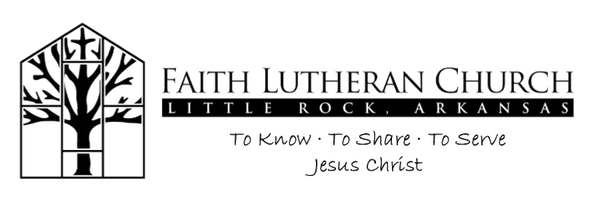|
I was blessed to be born into a strong nuclear family with a devoted faith life. I was raised in the First Christian Church (Disciples of Christ) in Little Rock, Arkansas. This was my Mother’s church. She sang in the choir. My Father had been raised in a rural Baptist congregation, but joined Mom’s church when they got married. It is the practice in that church to serve communion every Sunday and it was observed using only grape juice. One of my earliest memories of the church is when I was probably no more than 5 or 6 years old, and with a Sunday school buddy, we got into what Lutheran’s would call the sacristy before Sunday school, and drank a number cups of grape juice from the communion tray. We never knew if we had been found out. That denomination practices “believers’ baptism” so I was fully immersed during a worship service in the baptistery at the front of the church when I was about 13 years old. I must have received a solid Christian education. We faithfully attended Sunday school every Sunday and I recall that by the time I was a teenager, I had significant scriptural knowledge particularly of the Gospels. My Father taught adult Sunday school nearly all of his adult life. I remember his reading the Bible and otherwise preparing his lessons almost every Saturday evening. He was a popular teacher. I was aware of favorable comments on his lessons among congregation members. Of the several adult Sunday school classes, his was always the largest. Dad and I discussed the scriptures not infrequently over meals. He never read the Bible literally, so we engaged in a lot of speculation about the meaning of different stories. Those discussions sometimes made Mom uncomfortable, and she would admonish us, “I hope you don’t let others know what you two are thinking.” The Church had a strong youth program, and I was an active participant throughout high school. At the same time I was dating a young woman who was Jewish. Her family belonged to the Reformed Jewish congregation here in Little Rock, but they were not particularly religious. They strongly held to their Jewish identity, but seldom attended services at the Temple. I have a vivid memory of a Sunday school class when I was a senior in high school. The class was led by a very poplar teacher, who had taught the high school class for a number of years. We were discussing John 3:16. At the end of the class, I approached the teacher, whom I liked and admired, and asked does that scripture mean that Jews will go to hell if they do not accept Christ as their Lord and Savior? She replied in the affirmative. I found this answer unacceptable not only because I was in love with this young woman, but also because the answer simply did not square with my understanding of the Jesus revealed in the Gospels. As I look back that exchange was a pivotal event in my faith journey. I went away to college and among other courses took a religion course in the Judeo-Christian tradition and a separate course in comparative religion, which surveyed the world’s great religions. I became convinced that the institutional church, a/k/a, “organized religion” had betrayed the Gospel. I saw in history much more evil than good emanating from religious institutions. I still considered myself to be a follower of Jesus Christ, but I shared Thomas Jefferson’s skepticism of the supernaturalism in the Bible and wanted nothing to do with any “church” group. I ended up marrying my high school sweetheart while I was in college and we raised our two boys with little religious identification. At Christmas I would insist that the boys listen to a reading of the Christmas story, and we otherwise discussed the Bible as literature. In a conversation with my oldest son, Alan, when he was in high school, I quizzed him about his own religious beliefs. To one of my inquiries, he replied, “Dad, don’t worry I think about these things, but I believe in the “big bang.” We all were content with our life together until January 1, 1988, when Alan was killed in an automobile accident in the early hours of New Year’s Day after being the designated driver for a group of his college-aged friends from Governor’s School who had celebrated the incoming New Year together. It was a single car accident caused by his falling asleep and leaving highway 630 to crash into a pole. He probably did not suffer. The toxicology report routinely done in the case of an automobile accident reported no alcohol in his blood. He had been faithful as the designated driver. It is impossible to describe the sense of loss and despair that swept over us. Only days before his death, I had sat at our dinner table with Alan discussing Socrates’s Parable of the Cave. He was a bright and happy college student with a big heart and enthusiasm for the life that was coming at him. My wife and I proceeded into a sustain period of what I now understand to be “differential grieving.” I wanted to return to normalcy and support our younger son. My wife could not climb out of her despair, so we ended up in continued and progressive underlying conflict. Within 5 years of Alan’s death our marriage crumbled. To my surprise and chagrin my despair about life deepened. I never thought anything could be more painful than losing a child, but the prolonged abandonment process of a crumbling 25-year marriage seemed to eclipse the pain I experienced in early 1988. I spent at least a year numb and dysfunctional. I could not even function as a lawyer. I felt betrayal and anger at the loss of a child and a marriage. There seemed no to be no justice or purpose in what I was enduring. I was so estranged from God that I directed no blame or even anger toward God. I did resolve, however, that I would henceforth strive to do anything for others to relieve emotional pain and despair. I wanted no one to ever feel what I was feeling. A wise professional counselor, who happened to be a practicing Buddhist, helped me to begin recovery. I read about Buddhism, commenced a vigorous meditation practice and attended several Buddhist retreats. My life started to take on some order. My anxiety dissipated. I was again able to function professionally. During this time I started dating. I knew that I did not want to remain single, although I had learned to live alone fairly contentedly with only a couple of golden retrievers as intimate companions. During this time I met Trudy. We dated for a couple of years with the mutual recognition that we were genuinely and deeply attracted to each other. I was dating other women at the time, and I was concerned about making the “right” choice in another attempt at marriage. What differentiated Trudy from other women I had dated were a variety of factors, but most compelling was her spirituality. She was deeply committed to her faith and to her church. I found that spiritual depth to be irresistible. I asked her to marry me knowing that in order to share her life, I would have to share her faith, but I told her, “I will go to church with you, but never more than twice in a row. If I go more frequently, they will expect me to show up.” After attending at Faith and engaging with Pastor Michael McCarthy, I became very interested in Lutheran Theology. Being something of a skeptic, I was not going to commit to a faith practice that I did not understand and respect. I discovered that ELCA Lutheran theology and practice squared with my earliest understandings of the gospel. I thought maybe I had found a home. I had experienced Jesus as a 6th or 7th grader when I realized that all humans were going to die. That realization created several sleepless nights and great anxiety until I spent one night in continual prayer. I believe that Jesus literally came along side me that evening and I have never experienced a fear of death since then. That relationship was cemented by the book FRANNY AND ZOOEY by J.D. Salinger. Zooey knew the same Jesus I had experienced. As I returned to a faith practice I brought with me my experiences through mediation practice and Buddhist teaching. I now understand that my relationship with Jesus is only a gateway to the creator, to enlightenment, to Santori, which is the constant awareness of a mutually loving relationship with God, the understanding that all creation is one, and that creation is ongoing. This awareness brings great comfort and “the peace that passes all understanding.” It also determines one’s purpose. I believe the statement made by Christ as he exited from the desert of temptation, that “the Kingdom of God is at hand,” carries with it a call to participate in the coming of that Kingdom. And that call is to serve God’s intention for all of God’s creation without regard to race, creed, or belief system. All of the great faith traditions point to the same reality; they just use different fingers. Peter has been a member of Faith Lutheran Church since 1999. Peter grew up in Little Rock and practices law here. He is married to Trudy and together they enjoy visits with their kids and grandkids, getting away for some fly fishing, and at home enjoy raising the dogs, keeping the bees, and tending a community garden. Peter is engaged in the church Lead Team, Via de Cristo ministries, serving dinner at Our House, Arkansas-Oklahoma Synod ministries, and continuing to study, wrestle with, and learn more from scripture, theology, and the church. Peter is passionate about interfaith relationships, racial reconciliation, and participating in what God is doing to bring in the Kingdom of God.
|
AuthorStories of Faith and Life shared through promoted questions. Archives
May 2019
Categories |

 RSS Feed
RSS Feed



